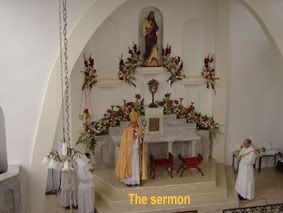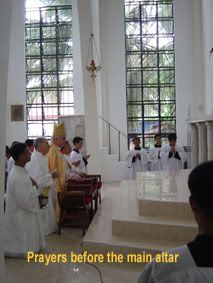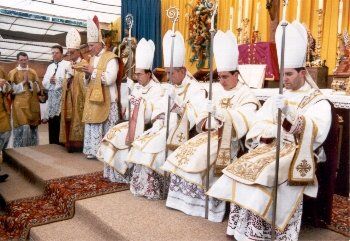SSPX LEADER HOPES VATICAN WILL TAKE "FIRST STEP"
Apr. 04 (CWNews.com) - Bishop Bernard Fellay, the superior of the Society of St. Pius X (SSPX), says that a Vatican initiative allowing wider use of the Latin Mass would be a welcome "first step" to satisfy the demands of traditionalist Catholics. But the leader of the Lefebvrist group says that it is still "premature" to speak about a full reconciliation between the SSPX and the Holy See.
In an exclusive interview posted on the DICI web site, Bishop Fellay acknowledged the widespread rumors that Pope Benedict will soon issue a "universal indult," allowing priests anywhere to celebrate Mass using the Tridentine rite, which prevailed throughout the Roman Church before the liturgical changes that followed Vatican II. The traditionalist leader said such a document could help to "create a new atmosphere in the official Church." He explained: "It would be a first step toward making traditional Catholic life possible again."
In talks with Vatican officials, aimed at restoring full communion between the Holy See and the breakaway traditionalist group, SSPX leaders have demanded that the Vatican allow free use of the Latin Mass throughout the world, and rescind the decrees of excommunication issued against Archbishop Marcel Lefebvre and the four traditionalist bishops he ordained in 1988. Those two steps, explained Bishop Fellay (who is one of the prelates involved), would help restore traditionalists' confidence in the Vatican. "The traditional Mass being no longer on probation and the ministry of traditional priests no longer clouded by the suspicion of excommunication," he said, would give traditionalists reason to trust Vatican negotiators in further talks.
However, the SSPX leader discouraged further speculation about a Vatican move setting up an apostolic administration to serve traditionalists. Such a move, he said, would be "premature" until a climate of trust had been restored.
Bishop Fellay told his interviewer that SSPX leaders believe that they are fulfilling a crucial need for the Catholic Church, by "safeguarding what is first and foremost the patrimony of the universal Church." He said that SSPX leaders are not deterred by the decrees of excommunication issued by the Vatican, "to which we never ascribed any canonical validity."
Results 1 to 10 of 28
-
04-24-2006, 08:29 PM #1Senior Member

- Join Date
- Jan 2006
- Posts
- 781
 Society of Saint Pius X - do you believe in them?
Society of Saint Pius X - do you believe in them?
-
04-24-2006, 08:34 PM #2Senior Member

- Join Date
- Jan 2006
- Posts
- 781
 Re: Society of Saint Pius X - do you believe in them?
Re: Society of Saint Pius X - do you believe in them?
SSPX was founded, with the provisional canonical approval of the Bishop of Fribourg (François Charnière), Switzerland in November 1970 by the controversial French Archbishop Marcel Lefebvre, former Superior General of the Holy Ghost Fathers, a Father of the Second Vatican Council, and one of the best-known modern prelates in Africa, where he spent much of his early career. He retired as head of the Holy Ghost Fathers in 1968 when the order began revisions of its constitutions, which Lefebvre considered modernist. The original founding of SSPX is generally considered to be the result of a conservative backlash that developed within the Catholic Church in response to the apparent radical revisions in both liturgy and Church policy that occurred during and after the Second Vatican Council of the early 1960s.
Shortly after his resignation, Lefebvre was approached by seminarians from the French Seminary in Rome who, they said, were being persecuted for their adherence to traditional beliefs and doctrines. They sought advice on a conservative seminary to complete their studies. He directed them to the University of Fribourg, Switzerland.
In 1970, urged by the Abbot of Hauterive and the Dominican theologian, Fr. Philippe, to teach these seminarians personally, Lefebvre approached the Bishop of Fribourg, who, three months before resigning the see, approved, with a document predated by six days to November 1, 1970, the founding of SSPX at the level of a "pia unio", the preliminary stage towards becoming an officially recognized religious institute or Society of Apostolic Life. ("Pia unio", in English "pious union", was the term used in pre-1983 canon law for such an experimental group, which would now be called an "association of the faithful".) Swiss laymen offered the seminary at Ecône, Switzerland to the newly formed group.
-
04-24-2006, 08:43 PM #3Senior Member

- Join Date
- Jan 2006
- Posts
- 781
 Re: Society of Saint Pius X - do you believe in them?
Re: Society of Saint Pius X - do you believe in them?
On August 5, 2004, His Excellency Bishop Williamson blessed the new church on the island of Cebu. This church is dedicated to St Pius V whose body, as the Bishop reminded the people during his sermon, is in St Mary Major. And on August 5, the Church celebrates the dedication of St Mary Major, also known as Our Lady of the Snow. The church, which can seat 150 persons, and the parish hall were built thanks to the generosity of benefactors who can be seen on either side of Bishop Williamson on the photo below. The lady is from Cebu but now lives abroad with her husband. Click here to know the Mass schedule in Cebu.



This sspx Church is located in Cebu.
San Jose Village
Opao, Mandaue City, Cebu
Tel: (63) (33) 523 5258
Contact: Fr. Saa in Sta Barbara
Mass Schedule:
2nd Sunday, Sung Mass at 6:00pm
following Monday, Low Mass at 6:00am
-
04-25-2006, 05:00 AM #4
 Re: Society of Saint Pius X - do you believe in them?
Re: Society of Saint Pius X - do you believe in them?
sorry for sounding ignorant... but these priest/order we're excommunicados? unsa reason?
-
04-25-2006, 02:50 PM #5
 Re: Society of Saint Pius X - do you believe in them?
Re: Society of Saint Pius X - do you believe in them?
Are we allowed to hear mass in this church?

-
04-25-2006, 08:57 PM #6Senior Member

- Join Date
- Jan 2006
- Posts
- 781
 Re: Society of Saint Pius X - do you believe in them?
Its complicated. They were declared schismatic group. In other words, not Catholic. But I understand Bishop Marcel Lefebvre reasons of defying Rome.
Re: Society of Saint Pius X - do you believe in them?
Its complicated. They were declared schismatic group. In other words, not Catholic. But I understand Bishop Marcel Lefebvre reasons of defying Rome. Originally Posted by shoeless_rebel
Originally Posted by shoeless_rebel
Sa ako lang simple nga pagsabot, the Society of Saint Pius X is opposed to the reforms of the Vatican II especially the Novos Ordo Missal. Wa sila makauyon nga ang misa pwede na ma celebrate using the local languages and not Latin. Wa pod sila makauyon nga ang pari mag atubang na sa mga tawo inig misa. Di pod sila uyon nga mokalawat nga dawaton sa kamot.
In churches run by SSPX, ang mga babaye nga manimbahan murag panahon sa Katsila. Nag mantilla sa mga ulo and then the liturgical music is purely Latin and Gregorian Chants. No drums, no guitars, no dancing. Its really solemn.
Personally I want to hear mass in their churches. But mahadlok lang ko basin i consider ko nga dili na ko Catholic. For me, the SSPX is the purest Catholic of all Catholics. And it really sticks to the tradition. My wish is that Rome would finally accept them and lift the excommunication. After all, SSPX is very loyal to Christ and very Catholic.
-
04-25-2006, 09:00 PM #7Senior Member

- Join Date
- Jan 2006
- Posts
- 781
 Re: Society of Saint Pius X - do you believe in them?
Re: Society of Saint Pius X - do you believe in them?

Now who will say that they are not Catholic?
-
04-25-2006, 09:04 PM #8Senior Member

- Join Date
- Jan 2006
- Posts
- 781
 Re: Society of Saint Pius X - do you believe in them?
Re: Society of Saint Pius X - do you believe in them?
The DECLARATION of Archbishop Lefebvre
made at Econe, Switzerland on November 21, 1974
We hold fast, with all our heart and with all our soul, to Catholic Rome, Guardian of the Catholic faith and of the traditions necessary to preserve this faith, to Eternal Rome, Mistress of wisdom and truth.APPENDIX I
On November 11, 1974, two apostolic visitors from Rome arrived at the International Seminary of Saint Pius X in Econe. During their brief stay, they spoke to the seminarians and professors, maintaining scandalous opinions such as, the ordination of married men will soon be a normal thing, truth changes with the times, and the traditional conception of the Resurrection of our Lord is open to discussion. These remarks prompted Archbishop Lefebvre to write this famous Declaration as a rebuttal to Modernism.
We refuse, on the other hand, and have always refused to follow the Rome of neo-Modernist and neo-Protestant tendencies which were clearly evident in the Second Vatican Council and, after the Council, in all the reforms which issued from it.
All these reforms, indeed, have contributed and are still contributing to the destruction of the Church, to the ruin of the priesthood, to the abolition of the Sacrifice of the Mass and of the sacraments, to the disappearance of religious life, to a naturalist and Teilhardian teaching in universities, seminaries and catechectics; a teaching derived from Liberalism and Protestantism, many times condemned by the solemn Magisterium of the Church.
No authority, not even the highest in the hierarchy, can force us to abandon or diminish our Catholic faith, so clearly expressed and professed by the Church’s Magisterium for nineteen centuries.
“But though we,” says Saint Paul, “or an angel from heaven preach a gospel to you besides that which we have preached to you, let him be anathema” (Gal. 1: .
.
Is it not this that the Holy Father is repeating to us today? And if we can discern a certain contradiction in his words and deeds, as well as in those of the dicasteries, well we choose what was always taught and we turn a deaf ear to the novelties destroying the Church.
It is impossible to modify profoundly the lex orandi without modifying the lex credendi. To the Novus Ordo Missae correspond a new catechism, a new priesthood, new seminaries, a charismatic Pentecostal Church —all things opposed to orthodoxy and the perennial teaching of the Church.
This Reformation, born of Liberalism and Modernism, is poisoned through and through; it derives from heresy and ends in heresy, even if all its acts are not formally heretical. It is therefore impossible for any conscientious and faithful Catholic to espouse this Reformation or to submit to it in any way whatsoever.
The only attitude of faithfulness to the Church and Catholic doctrine, in view of our salvation, is a categorical refusal to accept this Reformation.
That is why, without any spirit of rebellion, bitterness or resentment, we pursue our work of forming priests, with the timeless Magisterium as our guide. We are persuaded that we can render no greater service to the Holy Catholic Church, to the Sovereign Pontiff and to posterity.
That is why we hold fast to all that has been believed and practiced in the faith, morals, liturgy, teaching of the catechism, formation of the priest and institution of the Church, by the Church of all time; to all these things as codified in those books which saw day before the Modernist influence of the Council. This we shall do until such time that the true light of Tradition dissipates the darkness obscuring the sky of Eternal Rome.
By doing this, with the grace of God and the help of the Blessed Virgin Mary, and that of Saint Joseph and Saint Pius X, we are assured of remaining faithful to the Roman Catholic Church and to all the successors of Peter, and of being the fideles dispensatores mysteriorum Domini Nostri Jesu Christi in Spiritu Sancto. Amen.
-
04-25-2006, 10:03 PM #9Junior Member

- Join Date
- Apr 2005
- Posts
- 279
 Re: Society of Saint Pius X - do you believe in them?
Re: Society of Saint Pius X - do you believe in them?
Indeed, SSPX is not Catholic. If they are, then they would be obedient to the Pope. They are actually sedevacantists who do not recognize the authority of the current pope. Watch the play of words on the above quotation:
'We hold fast, with all our heart and with all our soul, to Catholic Rome'
Yet, the 'Rome' they speak of here does not have a Pope. You must ask then : did Christ withdraw his promise to Peter? Was the See of Peter led astray? It has always been a doctrine in the Church (way before Lefebvre was born) that doctrinal pronouncement is binding unless with the approval of the Bishop of Rome.
Just because their conduct on some things are exemplary does not make the 'purest Catholics of all Catholics'. It is unfortunate but they have been swimming in the dirt of schism.
Did the Catholic Church ban the use of Latin in its Holy Mass? No. The Constitution on the Sacred Liturgy, SACROSANCTUM CONCILIUM, has these to say:
36. 1. Particular law remaining in force, the use of the Latin language is to be preserved in the Latin rites.
2. But since the use of the mother tongue, whether in the Mass, the administration of the sacraments, or other parts of the liturgy, frequently may be of great advantage to the people, the limits of its employment may be extended. This will apply in the first place to the readings and directives, and to some of the prayers and chants, according to the regulations on this matter to be laid down separately in subsequent chapters.
3. These norms being observed, it is for the competent territorial ecclesiastical authority mentioned in Art. 22, 2, to decide whether, and to what extent, the vernacular language is to be used; their decrees are to be approved, that is, confirmed, by the Apostolic See. And, whenever it seems to be called for, this authority is to consult with bishops of neighboring regions which have the same language.
4. Translations from the Latin text into the mother tongue intended for use in the liturgy must be approved by the competent territorial ecclesiastical authority mentioned above.
D) Norms for adapting the Liturgy to the culture and traditions of peoples
...
37. Even in the liturgy, the Church has no wish to impose a rigid uniformity in matters which do not implicate the faith or the good of the whole community; rather does she respect and foster the genius and talents of the various races and peoples. Anything in these peoples' way of life which is not indissolubly bound up with superstition and error she studies with sympathy and, if possible, preserves intact. Sometimes in fact she admits such things into the liturgy itself, so long as they harmonize with its true and authentic spirit.
116. The Church acknowledges Gregorian chant as specially suited to the Roman liturgy: therefore, other things being equal, it should be given pride of place in liturgical services.
But other kinds of sacred music, especially polyphony, are by no means excluded from liturgical celebrations, so long as they accord with the spirit of the liturgical action, as laid down in Art. 30.
117. The typical edition of the books of Gregorian chant is to be completed; and a more critical edition is to be prepared of those books already published since the restoration by St. Pius X.
Unfortunately, confusion was the norm of the day after the closing of the Second Vatican Council. Part of that confusion is what happened to Bishop Lefebvre. Another incident that constitute disobedience from the part of Bishop Lefebvre is his consecration of other bishops which was barred by the Pope. Bishop Lefebvre then is a formal schismatic, and all his followers are in schism with the Catholic Church.
-
04-25-2006, 10:41 PM #10Senior Member

- Join Date
- Jan 2006
- Posts
- 781
 Re: Society of Saint Pius X - do you believe in them?
Re: Society of Saint Pius X - do you believe in them?
So dacs let me ask the question? If the Catholic Church does not ban the Latin Mass why there is no single Latin Mass celebrated in my Church? I am a traditionalist dacs but I am not yet ready to jump to SSPX. But I would like, as form compromise, that Rome shall institute a solemn Latin Mass Tridentine every Sunday. If Vatican allow this noisy Charismatic mass, it should allow also the Tridentine mass for Catholics like me.
Advertisement
Similar Threads |
|





 Reply With Quote
Reply With Quote

